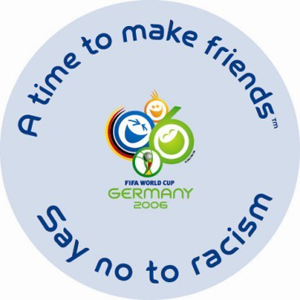As the eyes of the world turn to the quarter-finals of the 2006 FIFA World
Cup, FIFA have taken advantage of the occasion to continue the fight against
discrimination in all its forms. These special events, known as FIFA
Anti-Discrimination Days, are taking place on 30 June and 1 July with the full
involvement of those teams still remaining in the competition.

Germany 2006 -
Anti-racism banner: This banner covering the entire centre circle, will be
used at all matches and in all stadiums during Germany
2006.[FIFAworldcup.com] |
¡°FIFA places great store
on respect for a person¡¯s ethnic origin. And football, in its role as the
world¡¯s most popular sport, has the influence to fight against racism.
The unifying ability of football can help people to understand that the
colour of a person¡¯s skin has no relevance whatsoever in our daily lives, or in
our sport.¡± The words of FIFA President Joseph S. Blatter underline the
importance of these FIFA Anti-Discrimination Days, the first of their kind to be
held at the FIFA World Cup.
Each quarter-final clash here at Germany 2006 will have a variety of formal
acts, including a joint photo between the participating teams holding a 'Say No
to Racism' banner, as well as a speech read out by the respective captains.
Argentina skipper Juan Pablo Sor¨ªn took this further by personalising the
message he read before Friday¡¯s game with hosts Germany, with England¡¯s David
Beckham set to do the same on 1 July.
A number of EC ministers will also be in attendance for these commemorative
events, which also include Saturday¡¯s tantalising quarter-final clashes between
Brazil-France and England-Portugal.
United in protest
And it is not just footballers who wished to send a message out to the world
denouncing the twin evils of racism and discrimination:
¡°Even though I couldn¡¯t be in Germany, this initiative has my unconditional
support. Sport can be a great power for good and play a leading part in the
fight for human rights.¡± (Nelson Mandela, former President of South Africa and
winner of the Nobel Peace Prize)
¡°We¡¯ve taken a step forward, but we need every fan of this beautiful game to
do their bit too. We¡¯re all footballing ambassadors, and now that we have
developed the game and brought the world closer together, the time has come for
us to use football to provide a better future. (FIFA President Joseph S.
Blatter)
¡°This is a fantastic initiative. The fact that millions of fans can enjoy
football and, at the same time, be made more aware of these kind of problems is
really praiseworthy.¡± (Frank-Walter Steinmeier, German Foreign Minister)
¡°This is a brave initiative by FIFA which, although it cannot solve the
problem on its own, delivers a clear message. This is a project which has moved
us all.¡± (Tokyo Sexwale, South African Human Rights activist and Member of the
Organising Committee for the 2010 FIFA World Cup South Africa)
¡°The root causes of racism and discrimination are degradation and contempt
for other human beings, whether it be for reasons of sex, race, disability or
anything else. FIFA deserves praise for confronting the issues of racism and
discrimination.¡± (Ann M. Veneman, Executive Director of UNICEF)
"I think what is crucial is that FIFA has shown a great leadership. I¡¯ve
always said about these issues that they are very serious and very sensitive,
but FIFA has shown that it is the Daddy of the situation. I applaud and welcome
the initiatives and it sends out a very positive message of intent by FIFA."
(Special advisor, Commission of Racial Equality, Great Britain)
"We at FIFPRO are delighted that FIFA has taken this initiative because it¡¯s
very important to demonstrate to the world that any form of discrimination has
no place in football." (Tony Higgins, Chairman of FIFPRO Anti-Racist Committee)